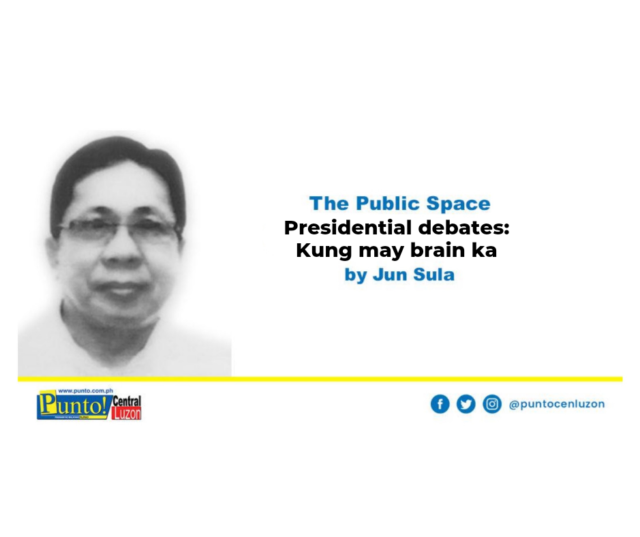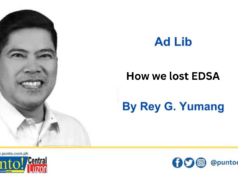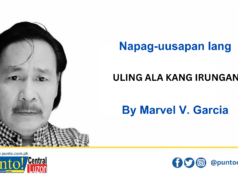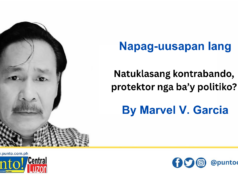MENTAL FITNESS is always presumed and, therefore, never inquired of a presidential aspirant ,or anyone running for public office, for that matter, in a public forum such as a presidential debate. Interviews are a different genre, especially the pre-arranged. They are more likely than not to butter up rather than bruise a candidate’s ego.
The exceptionally ambitious can be asked tough questions later in another time and place. By their answers, you shall know them. Ultimately, the time limit imposed — 90 seconds or less – to field the question will be the litmus test of a bet’s quality of wit and wisdom. Thinking, especially out of the box (notes not allowed) , is tough work and some candidates would rather avoid being boxed in. In itself, it is already a give-away not just of one’s character but of grey matter.
In the words of Vice President Leni Robredo, it is, in fact, synonymous with leadership.
“Politics is neurology writ large,” George Saunders wrote. In a word, we vote for neurons, or the deficiency of them, in those who seasonally envision the promised land but never get us there or leave us in a lurch or worse, plundered. At one time, Robredo explained why we are the way we are: blame it on our bad habit to shoot ourselves in the foot each time we cast the ballot, over and over again.
But are neurons in our leaders really the problem?
In a 90-second question, they can be, according to presidential bet Jose Montemayor Jr. , a doctor and lawyer and one who boasts of being a topnotch performer. The surveys are not convincing, though. His on-the-spot assessment came after another bet, Sen. Ping Lacson, heard the buzzer before he could complete his answer. Montemayor loudly rued that while the brain is still working on the right, perhaps the best, answer, the 90 seconds are already gone.
As if raising the ante, “kung may brain ka”, he qualified during the CNN presidential debate last Sunday, ,not betraying on his vast face if he was joking or if he was serious. It could have been selective indictment. He also forgets what is truer: that the shortest distance between two points is the straight line. Context, or excuse, can just be pretext for not knowing the right one. Neuron highways are key.
Presidential debates are supposed to be tough. Which means, the candidates cannot leave their brains home without them. And even if they don’t, somehow their answers in the nitty gritty reveal how much grey matter lies in between their ears. But woe to the aspirant who decides not to show up , for netizens will have a field day. One of them excoriates with two liners, like a Japanese haiku. “ The empty podium means an empty mind. The empty podium means empty promises.”
One interesting portion of the debate was when the numbers 11.7 trillion were displayed on the background screen. All the aspirants, except Manila Mayor Isko Moreno, correctly defined the numbers as the country’s total debt. Moreno’s saw differently: he defined the figures as ” challenge”.
Was Sen. Manny Pacquiao overreaching or worse, in over his head, when he said that he would haul all the corrupt in government and put them together in a mega jail he would still build in three months after he assumes office? Lacson was being more Kennedyisque and realistic in saying he hates deadlines although he planned 100 days of massive government cleansing. Duterte was more conservative: he only needed six months . Where are we, by the way, in his grandiose plan, with three months left to goodbye?
In his inaugural address, the late American President John F. Kennedy understood that his task “will not be finished in the first 100 dass, nor in the first 1,000 days , nor in the life of this administration, nor in our lifetime in the planet.” Yet, Kennedy was said to have America’s “best and brightest’ in his administration romanticized like the Camelot legend .
Robredo was no less realistic, but she gave herself two years into her presidency when her impact would be felt. The vice president has been endorsed, like no other, by the country’s crème de la crème in government and the private sector from where she could form her own Cabinet. In other words, she had the reason to be fully confident about the quality of her government in terms of integrity, expertise and character. Neurons, too.
More than two centuries ago, the British philosopher John Mills warned of the possibility of electing people of low-intellect (less neurons) in a representative government. “Deficiency in high mental qualification is one to which it is generally supposed that popular government is liable to a greater degree,” he wrote.
Former First Lady Imelda Marcos knows the importance of neurons. Some people, she once said, are just smarter than others. Former Sen. Serge Osmena recently named names as to who were the brighter, ergo luckier, ones during her dictator-husband’s regime. Some of them are still alive and kicking, spreading the dubious narrative of “a golden age” that never was. Neurons can be a problem, too.
The recent political debates, or what pass for such, have distilled at least two things. One, the best Filipinos, not exactly the brightest, are not in government, but somewhere else—in the private boardrooms or in the boondocks. Two, we haven’t been that neurotically sound at choosing the best that are available to lead us into the proverbial promised land.
There is a pervasive sense of déjà vu , even as the public debates clarify and sift, as it were, our choices of the country’s next leaders. The one who has made himself scarce in intelligent debates appears to have the edge. A long time ago, it was said that the Philippines had a population of 35 million nincompoops ruled by one SOB. Will lightning strikes twice in the same place?
The debates are no zero-sum exercises.. More and more people are getting uneasy, even alarmed, by his deliberate absence. Will the voters summon their neurons in time?
Montemayor’s honest-to-goodness question might as well be addressed to the more than 60 million voters who will choose the next president on May 9. There’s still time.




